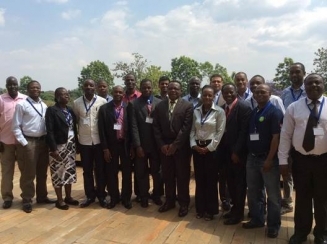
On 17-21 October 2014, the African Capacity Building Foundation (ACBF), conducted a series of two training workshops on the Foundation’s 2015 Africa Capacity Flagship Report data collection in Harare, Zimbabwe.
The sessions, organized along linguistic lines, sought to improve the knowledge and skill sets of in-country data experts on the annual theme of the 2015 Africa Capacity Report (ACR) which will focus on “Capacity Development for Domestic Resource Mobilization”. The workshops highlighted the literature underpinning the issue of domestic resource mobilization, discussed potential data sources, field experiences, and ensured a shared understanding of the process as well as the survey instrument. The forum also provided an opportunity to dialogue on broader issues associated with the Africa Capacity Report initiative. The two workshops engaged a total 40 in-country data experts from across 40 African countries.
In welcoming the 2015 cohort of in-country data experts, Prof Emmanuel Nnadozie, the ACBF’s Executive Secretary, said how critical it is for African countries to mobilize their own domestic resources for their development agenda. He highlighted the importance of the data collection exercise in the production and quality of the report. Prof. Nnadozie urged the experts to take advantage of the training workshop to share experiences, good practices and be ACBF’s goodwill Ambassadors in promoting the use of the ACBF Africa Capacity Report in academia and, in informing development policies in their respective countries. He also reminded data experts of ACBF’s commitment not only to capacity development, but also to enhancing Africa’s results agenda.
Prof Nnadozie, further pointed out about ACBF’s shared solidarity and concern to the West African Countries and families, affected by the Ebola virus disease; he restated that, ACBF stands by these countries during this difficult times and, ACBF will always be ready to support efforts to reconstruct these countries to overcome the devastating effects of Ebola virus diseases, so as to get them back on development trajectory as quick as possible.
As a result of the training and brainstorming sessions by the two groups, some survey questions were modified, others edited appropriately, and a revised draft survey instrument generated to undertake the field surveys across 46 African countries, notably: Algeria; Benin; Botswana; Burkina Faso; Burundi; Cameroon; Cabo Verde; CAR; Chad; Comoros; Congo Rep. of; Congo, DRC; Côte d’Ivoire; Djibouti; Egypt; Ethiopia; Gabon; Gambia (the); Ghana; Guinea; Guinea Bissau; Kenya; Lesotho; Liberia; Madagascar; Malawi; Mali; Morocco; Mauritania; Mauritius; Mozambique; Namibia; Niger; Nigeria; Rwanda; Sao Tome and Principe; Senegal; Sierra Leone; South Africa; South Sudan; Swaziland; Tanzania; Togo; Tunisia; Uganda; Zambia; Zimbabwe. The data collection exercise is set to begin last week of October 2014.





